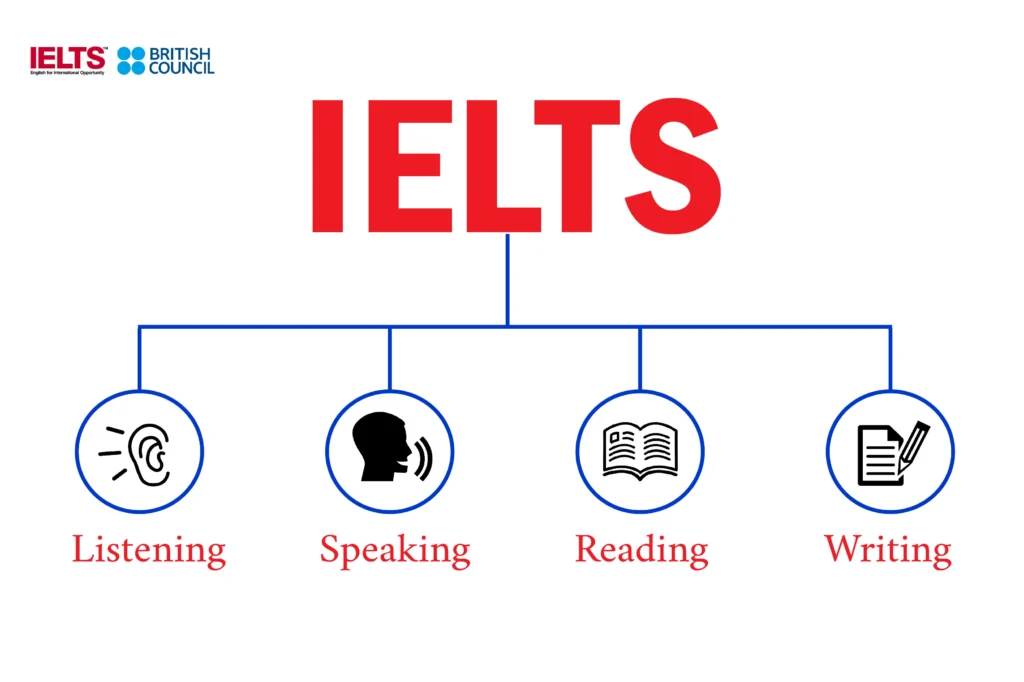
The IELTS test is a big deal for people who want to study, work, or live in places where English is the main language. It’s like a key that opens doors to many opportunities around the world. This test checks how well you understand and use English in different situations. Whether you’re planning to study in a university abroad or move to another country for work, IELTS is your ticket to success.
In this guide, we’ll break down everything you need to know about what is IELTS test?. From what it is and why it’s important to how it’s structured and what you can do to prepare, we’ve got you covered. By the end, you’ll feel more confident and ready to take on the challenge of the IELTS test, knowing that with the right preparation, you can reach your goals and open up exciting new opportunities in your life.
What is IELTS Test?
IELTS stands for the International English Language Testing System. It’s a test that measures how well you understand and use English. It’s important for people who want to study, work, or live in places where English is the main language. There are two types of IELTS tests: Academic and General Training. The Academic test is for people who want to study in universities or colleges in English-speaking countries. The General Training test is for those who want to work, train, or live in an English-speaking environment. Overall, IELTS helps organizations like schools, employers, and governments know if you have the English skills needed to succeed in those places.
Benefits of IELTS
The IELTS test offers several benefits for individuals aiming to study, work, or migrate to English-speaking countries:
- Global Recognition: IELTS is recognized by over 12,000 institutions worldwide, including universities, colleges, employers, and immigration authorities. This wide recognition ensures that your English language proficiency is acknowledged by institutions and organizations globally.
- Academic Opportunities: For students aspiring to study abroad, IELTS is often a mandatory requirement for admission to universities and colleges in English-speaking countries. Achieving a high score in IELTS opens doors to academic opportunities and scholarships.
- Employment Prospects: Many employers worldwide recognize and value IELTS scores as evidence of English language proficiency. A good score can enhance your employability and career prospects, especially in multinational companies and industries that require English communication skills.
- Immigration Requirements: Several countries, including Australia, Canada, the UK, and New Zealand, require IELTS scores as part of their immigration processes. Meeting the language proficiency criteria through IELTS can facilitate your immigration application and settlement in these countries.
- Language Development: Preparing for IELTS enhances your English language skills, including listening, reading, writing, and speaking. The structured preparation process helps improve grammar, vocabulary, pronunciation, and overall fluency in English.
- Cultural Exposure: The IELTS test exposes you to English-language materials and contexts, providing insights into the culture, customs, and academic or professional practices of English-speaking countries. This cultural exposure can be beneficial for adapting to new environments during study, work, or migration.
- Personal Growth: Successfully preparing for and taking the IELTS test requires dedication, perseverance, and goal-setting. The experience of preparing for a standardized test and achieving your desired score can boost your confidence and self-esteem, fostering personal growth and development.
IELTS Modules

The IELTS test consists of four modules, each assessing different language skills:
Listening:
In this module, candidates listen to recordings of conversations, monologues, and discussions, and answer questions based on what they hear. The recordings are typically of native English speakers and cover a range of topics and accents. Candidates are assessed on their ability to understand main ideas, details, opinions, and the speaker’s purpose.
Reading:
The Reading module presents candidates with a variety of texts, including articles, advertisements, and extracts from books or newspapers. Candidates answer comprehension questions that test their ability to identify main ideas, understand details, infer meaning, and analyze the writer’s opinions and attitudes. The texts cover both factual and academic content, and questions may require different reading strategies such as skimming and scanning.
Writing:
In the Writing module, candidates are required to complete two tasks. Task 1 involves writing a description of visual information, such as a graph, chart, or diagram. Task 2 is an essay in response to a prompt or question. Candidates are assessed on their ability to organize ideas, develop arguments, use appropriate language and grammar, and demonstrate coherence and cohesion in their writing.
Speaking:
The Speaking module is a face-to-face interview with an examiner. It consists of three parts. Part 1 involves general questions about familiar topics such as hobbies, family, and daily routines. In Part 2, candidates are given a topic and have one minute to prepare before speaking for up to two minutes. Part 3 involves a discussion based on the topic from Part 2, focusing on broader issues and abstract ideas. Candidates are assessed on their fluency, vocabulary, pronunciation, grammar, and ability to express ideas coherently.
Each module is designed to assess specific language skills and abilities, and candidates receive a score for each module as well as an overall band score, which is an average of the four module scores.
Frequently Asked Question

What are the types of IELTS?
There are two types of IELTS: Academic and General Training. The Academic module is suitable for individuals planning to pursue higher education or professional registration, while the General Training module is designed for those seeking work experience or migration to an English-speaking country.
Why should you enroll in IELTS?
Enrolling in the IELTS Test can provide numerous benefits, such as improving your chances of admission to universities or colleges abroad, enhancing your employment prospects, meeting visa requirements for migration, and gaining international recognition for your English language skills.
What is the format of the IELTS Test?
The IELTS Test consists of four sections: Listening, Reading, Writing, and Speaking. The Listening and Speaking sections are the same for both Academic and General Training, while the Reading and Writing sections differ based on the module chosen.
How is the IELTS Test scored?
The IELTS Test is scored on a band scale from 1 to 9, with 1 being the lowest and 9 being the highest. Each section is assigned a separate band score, and an overall band score is provided based on the average of the four sections.
How can I prepare for the IELTS Test?
To prepare for the IELTS Test, you can practice with sample test materials, enroll in preparation courses, study relevant English language materials, improve your vocabulary and grammar, and take mock exams to familiarize yourself with the test format and timing.
How often is the IELTS Test conducted?
The IELTS Test is conducted multiple times throughout the year, with test dates available on a regular basis. It is advisable to check the official IELTS website or contact authorized test centers to get the most up-to-date information on test dates and registration.
How long is the validity of the IELTS Test score?
The validity of an IELTS Test score is typically two years from the date of the test. After the expiration of this period, the score becomes invalid and may not be accepted by educational institutions, employers, or immigration authorities.
Can I retake the IELTS Test if I am not satisfied with my score?
Yes, you can retake the IELTS Test if you are not satisfied with your score. There are no restrictions on the number of times you can take the test, but it is recommended to thoroughly prepare before attempting it again.
How can I register for the IELTS Test?
To register for the IELTS Test, you can visit the official IELTS website or contact authorized test centers in your region. Registration can typically be done online or in-person, and you will be required to provide necessary identification documents and pay the test fee.
To conclude, the IELTS test is a crucial step for individuals seeking to pursue international opportunities and demonstrate their English language proficiency. Understanding the test format, sections, and scoring system is essential for achieving success. If you are looking to enhance your IELTS preparation and secure better results, contact AEC Trainings to enroll in our comprehensive course. Our experienced instructors will provide you with the necessary skills and strategies to excel in the exam. Don’t miss out on this opportunity! Contact us today for more information.
